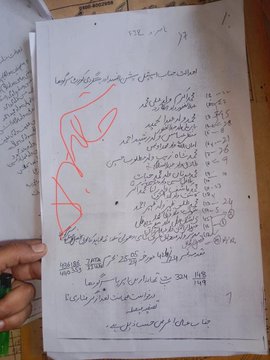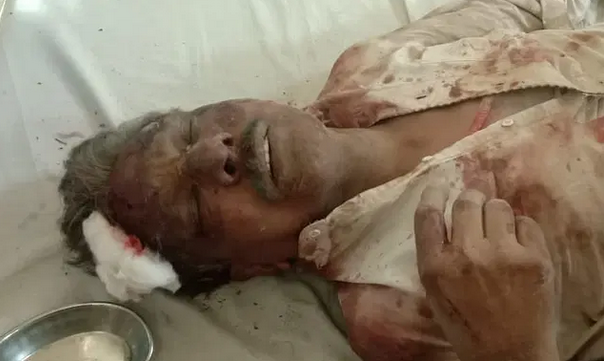Last week, a miscarriage of justice unfolded as a judge, bowing to the weight of a bungled police investigation and the clout of an Islamist extremist party, granted bail to 52 Muslims accused of brutally killing a Christian man based on a baseless blasphemy accusation. Special Judge Anti-Terrorism Court Sargodha, Muhammad Abbas, on Thursday (June 13), permitted the release of the suspects, including three individuals named in the First Information Report (FIR), who were involved in the lynching of 74-year-old Nazeer Masih Gill in the Mujahid Colony area of Sargodha, Punjab Province, on May 25. Despite the agony endured, Gill succumbed to his injuries on June 3 at a military hospital in Rawalpindi.
Attorney Asad Jamal, his voice laden with regret, expressed his dismay at the release of the suspects. However, he had expected it due to the police’s “intentional” negligence in the investigation. “The police’s conduct was suspicious from the onset,” Jamal said. “The investigators neither preserved the crime scene nor made any attempt to interrogate the detained suspects. The suspects were arrested and sent to jail on the same day, whereas the police should have sought their physical remand for interrogation to record their ‘first version’ statements to link their involvement in the incident.”
Jamal, a Muslim lawyer with a history of defending those falsely accused of blasphemy, including Christians, was part of a fact-finding mission from the Human Rights Commission of Pakistan (HRCP). The HRCP’s investigation painted Gill’s lynching as a “calculated assault, manipulated through religious fervor to gain maximum leverage.” This poignant statement underscores the sinister motives behind the attack, revealing a deeply troubling picture of how religious zealotry can be exploited to orchestrate violence and evade justice.
The grief and frustration felt by Gill’s family and the Christian community are immeasurable. The release of the suspects not only betrays the memory of a man whose only crime was being falsely accused but also sends a chilling message about the state of justice in cases tainted by religious extremism.
Attorney Asad Jamal’s voice trembled with indignation as he revealed the harrowing details of the police’s deliberate sabotage in Nazeer Masih Gill’s case. “It was clear that the police had deliberately recorded statements of false witnesses to damage the case,” Jamal stated, his frustration palpable. “They should have identified neighbors who witnessed the entire incident and recorded their statements, but it was not done. Moreover, the police have not recorded the statements of Gill’s family to date.”
The depth of the injustice is staggering. Jamal disclosed that the police had kept Gill’s family in the dark, withholding crucial information from them, though they are an integral part of the case. “Bails are not granted without notice,” Jamal exclaimed. “Why didn’t the judge summon the affected family? Why didn’t the police inform them about the bail hearing and bring them to court to present their point of view?”
Jamal’s despair deepened as he spoke about the apparent lack of governmental intent to gather evidence and prosecute the suspects. “According to criminal procedure, though the family can make a representation in the case, the responsibility of prosecution is on the government, and it has to take a lead in it,” he explained. “There is no indication that the government has any intention of gathering evidence and prosecuting the suspects.”
The path ahead for Gill’s family is fraught with obstacles. Jamal suggested that while the family could file a private complaint, the prospects are grim. “Will the police share their evidence with the family?” he questioned a note of hopelessness in his voice. “It is not easy to pursue a private complaint in court, particularly in cases where a mob is involved. This particular case is very complicated – both politically and legally – and there’s very little hope for justice for the victim.”

The anguish felt by Gill’s family and the Christian community is profound, as the very system designed to protect and deliver justice seems to conspire against them. The calculated inaction and obfuscation by the police, coupled with the indifference of the judiciary, cast a dark shadow over the possibility of justice for Nazeer Masih Gill.
Jamal decried the government’s inaction against the hardliner Islamist party Tehreek-e-Labbaik Pakistan (TLP), which had brazenly staged a massive protest in Sargodha to shield their members involved in the brutal lynching of Nazeer Masih Gill. “TLP leaders publicly threatened police and Christians and proudly endorsed Gill’s killing, yet no action has been taken against them,” he stated, his frustration barely contained. “It was also a clear attempt to pressure the court. Expecting Pakistani judges to hear and decide sensitive cases without the support and protection of the government is tantamount to giving them a death sentence.”
The injustice was further compounded by the Urban Area Police Station’s registration of an FIR on behalf of the state against 44 named and 300 to 400 unidentified suspects. The case was lodged under several sections of the Anti-Terrorism Act (ATA) 1997 and Pakistan Penal Code (PPC), including murder, attempt to murder, obstructing public officials in discharging their duty, assaulting a public official, and mischief by fire or explosive material with intent to destroy a house or cause death or hurt.
Despite the severity of the charges, Judge Abbas admitted the suspects’ pleas, in which they claimed that the police had implicated them based solely on suspicion. They argued that the police had failed to specify their individual roles in the incident and pointed out that none of the 18 witnesses had identified them. “Moreover, nothing has been recovered from their possession,” they added.
In a decision that shocked and dismayed the victim’s family and community, the judge accepted the petitions and ordered the release of the suspects on bail against surety bonds of 100,000 rupees (US$360) each.
The stark contrast between the gravity of the crime and the leniency granted to the accused leaves a lingering sense of injustice. The government’s reluctance to act against TLP and the court’s decision to release the suspects underscore a deeply flawed system that seems to bend under the weight of extremism and fails to protect its most vulnerable citizens. For Gill’s family, the hope for justice grows dimmer, overshadowed by a system that appears indifferent to their suffering and to the tragic loss of an innocent life.
The release of the suspects sent shock waves through the Christian community and human rights advocates, leaving them disheartened and disillusioned. They fear that the outcome of Nazeer Masih Gill’s case will mirror the Jaranwala cases of August 16, where all detained suspects were freed on bail and court proceedings were halted due to flawed police investigations and weak prosecutions.
Sultan Gill, the victim’s son, confirmed that the police had neither recorded their statements nor informed them about the bail applications. “The news of the bails came as a surprise to us,” he revealed. “We only came to know about this when the police suddenly increased deployment in our area, as most of the men freed on bail are from our neighborhood.”
Sultan’s voice quivered with frustration as he described the oppressive atmosphere his family now faces. “Police are forcing us to stay indoors, making us prisoners in our own house,” he said. “We are clueless and don’t know where this case is heading. I don’t think we have any other option but to relocate from this city.”
The heartbreak and fear felt by the Gill family echo throughout the Christian community. Though church leaders and Christian socio-political activists have spoken out against the escalating violent persecution, the government’s silence and inaction have led many to believe that they have been abandoned to the whims of Islamist extremists.
The disappointment and fear permeating the Christian community are palpable. Their hope for justice dwindles as they witness the system’s failure to protect them. The government’s apathy not only undermines the rule of law but also leaves an entire community vulnerable and forsaken. For the Gill family and countless others, the release of the suspects is a devastating reminder of their precarious existence in a society where justice remains elusive.
